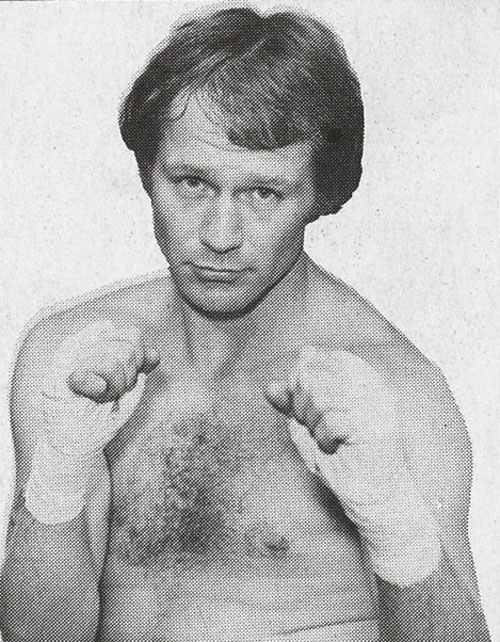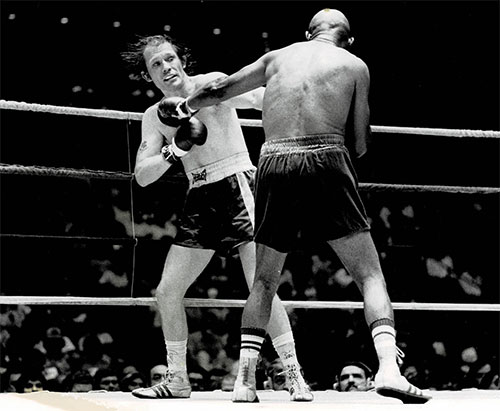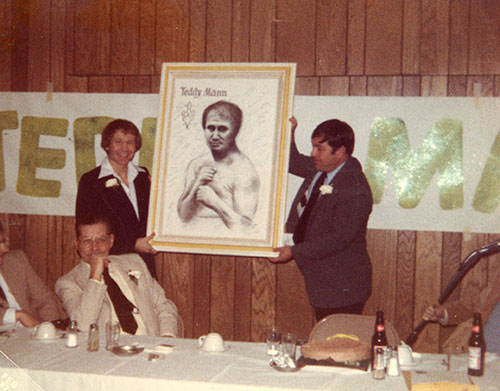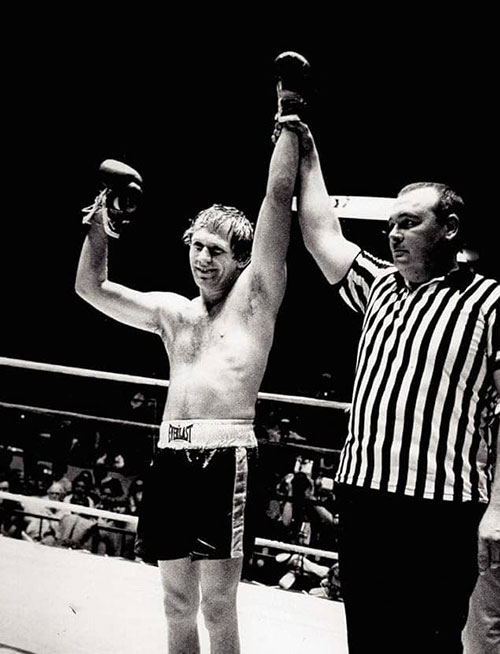| |
|
The term “Jersey
Strong” has come to symbolize the resilience, toughness, and
rugged pride of those living in New Jersey’s coastal
communities. Popularized after Superstorm Sandy in 2012, the
phrase aptly describes Shore natives shaped by both the
beauty and brutality of nature.
One such native was
Theodore Mannschreck, known in the boxing world as “Irish”
Teddy Mann. Born on September 5, 1951, in Point Pleasant,
Mann grew up in nearby Forked River. A talented athlete, he
excelled in cross country and track at Central Regional High
School, but it was boxing where he truly made his mark. As
an amateur, Mann faced stiff competition, including
Philadelphia’s Curtis Parker, and trained under respected
New Jersey Boxing Hall of Fame inductees Johnny Trojian
(“Kid Troy”) and Frank Lavalle.

Mann turned professional as a middleweight on August 25,
1977, scoring a third-round TKO over Larry Washington at
Gittone Field in Vineland. He would go on to compile a
record of 27-15 (14 KOs), drawing passionate crowds across
New Jersey and Philadelphia.
Like many Jersey Shore
fighters, Mann often traveled to Northeastern urban hubs
like Philadelphia, Atlantic City, and New York to prove
himself. He fought 12 times in Atlantic City and appeared on
several cards promoted by Hall of Famer J Russell Peltz at
the Spectrum in Philadelphia. The Pride of Forked River won
five of seven fights at the famed venue.
Mann made
his Spectrum debut on November 1, 1977, knocking out Titus
Burgess in the second round. The card, under the Spectrum
Fights banner, also featured stars like Marvin Johnson and
Matthew Saad Muhammad. In the main event, Johnson secured a
fifth-round TKO over Billy Douglas.
A January 17,
1978 showdown at the Spectrum with Philadelphia's Jerome
Jackson marked Mann's first defeat as a professional,
falling to 4-1. In the four-round contest on the undercard
of Jimmy Rothwell versus Mike Everett, Jackson appeared to
be the more polished fighter, effectively using and control
to counter his aggressive opponent. As the fight progressed,
Jackson established his dominance. Mann moved forward in the
fourth and final round, hoping to steal the close bout, but
Jackson responded with the cleaner punches. This frame
sealed the victory for Jackson, but Mann learned an
important lesson that day; one that he would carry with him
over the next 14 victories.

One of those victories came on April 3, 1979, when Mann
defeated Upper Darby’s Richie “The Bandit” Bennett by
unanimous decision. Bennett was coming off two straight
victories in his hometown when he stepped into the ring
against Mann on the undercard of Thomas “Hitman” Hearns
versus Alfonso Hayman. In a 10-round, unanimous decision
victory, Mann handled his business well against an opponent
known to be a power puncher. Having improved his record to
19-1, this victory paved the way for bigger fights and
paydays in 1979. As Bennett aggressively advanced towards
Mann, the Jerseyman effectively managed the ring, landing
consistent jabs and combinations throughout the contest.
On May 14, 1979, Mann returned to the Spectrum to face
journeyman Archie Andrews on a card headlined by a
bantamweight contest between future world champion “Joltin’”
Jeff Chandler and Mexico’s Justo Garcia. Known as the
“Caucasian Killer” for a string of victories over white
boxers including Guy Gargan, Rudy Donato, and Tony Tassone,
Mann avoided being another victim by scoring a seventh-round
technical knockout victory, the twelfth of his career.
Two months later at the Spectrum, Mann followed up his
victory over Andrews with another technical knockout win
over Perry Abney. In a July 16th showdown against a tough
Philadelphia veteran fighter known affectionately as “Lil’
Abner,” Mann recorded a TKO victory just before the
two-minute mark of the sixth round. The fight was waived off
by longtime Philadelphia boxing fixture, referee Joe
O’Neill. Three down from the top of the card, this
Peltz-promoted show featured an all-Philadelphia main event
between middleweights Curtis Parker and Willie “The Worm”
Monroe, with Parker walking away the victor in a hard-fought
contest. The co-main event saw another Philly fighter Jerry
Martin send opponent Willie Taylor home to Brooklyn with a
TKO loss. Mann’s decisive victory over a respected
gatekeeper on a high-profile Philly card set up a showdown
against the city’s popular boxing attraction, “Bad” Bennie
Briscoe.

The Briscoe fight, held November 9, 1979, was arguably
the biggest of Mann’s career. Entering at 18-1, he faced the
62-18-5 Briscoe, a legendary figure who had gone toe-to-toe
with Marvin Hagler, Carlos Monzón, and Rodrigo Valdéz. In
front of a roaring crowd of 7,104, Briscoe unleashed
relentless pressure. As Peltz later noted in his 2021 book,
Thirty Dollars and a Cut Eye, Mann couldn’t punch hard
enough or move well enough to disrupt Briscoe’s rhythm.
After injuring his right hand early in the fight, Mann
relied on his jab but visibly faded in the later rounds.
Briscoe won a unanimous decision on all three scorecards.
Mann’s final fight in Philadelphia came on November 14,
1979. Eager to return to the ring after a disappointing
defeat to Briscoe, Mann struggled to control his fight with
Philadelphia’s Tony “Rocky” Tassone, a super middleweight
who entered the contest with a record of 17-3-2. The fight
went the 10-round distance with Mann narrowly defeating his
opponent by split decision.
Unfortunately, the injury
sustained during the Briscoe fight proved to be a career
turning point. Over his final 22 professional bouts, Mann
went 9-13, facing elite names like Bobby Czyz, Mickey
Goodwin, Vinnie Curto, Robbie Epps, Doug DeWitt, and Juan
Domingo Roldán. Though victories became rare, Mann’s grit
and toughness continue to earn him respect in boxing
circles.
Though he fought many of his toughest
contests in Philadelphia, Mann was a fan favorite in
Atlantic City. His May 16, 1982 bout against ranked
middleweight James “Hard Rock” Green at Harrah’s Marina
Hotel Casino was one of his best late-career performances.
Despite losing by unanimous decision, Mann showed grit and
determination against a younger and highly regarded
opponent. His 12 appearances in Atlantic City helped cement
his legacy in the resort town. On September 27, 2025, this
legacy will be honored with an induction into the Atlantic
City Boxing Hall of Fame.
After retiring in the
mid-1980s, Mann continued to give back to the sport as a
trainer and mentor. He shared his story in a 2011
autobiography, Fighting for Redemption: The Irish Teddy Mann
Story, co-written with William Brennan. This book chronicles
his boxing career as well as struggles outside of the ring
with addiction and criminal activities.

Mann passed away on December 10, 2024, at age 73. His
death, like many fighters of his era, went largely
unnoticed, even within boxing circles. But on September 6,
2025, friends, family, and fans will gather to honor his
memory at an Irish Wake hosted by Mann's lifelong friend Joe
Court with assistance from John Martin, the Atlantic
City Boxing Hall of Fame's Exhibits & Memorabilia
Coordinator. It’s a fitting tribute for a fighter who
embodied “Jersey Strong.” For die-hard boxing fans along the
Shore, Mann was more than a contender, he was a local hero,
a symbol of resilience, and a son of New Jersey.
For
more information on the Irish Wake event for “Irish” Teddy
Mann and to purchase tickets, please visit the official
Facebook page. Proceeds from ticket sales will go towards
the purchase of a gravestone for the beloved fighter.
|
|
|




